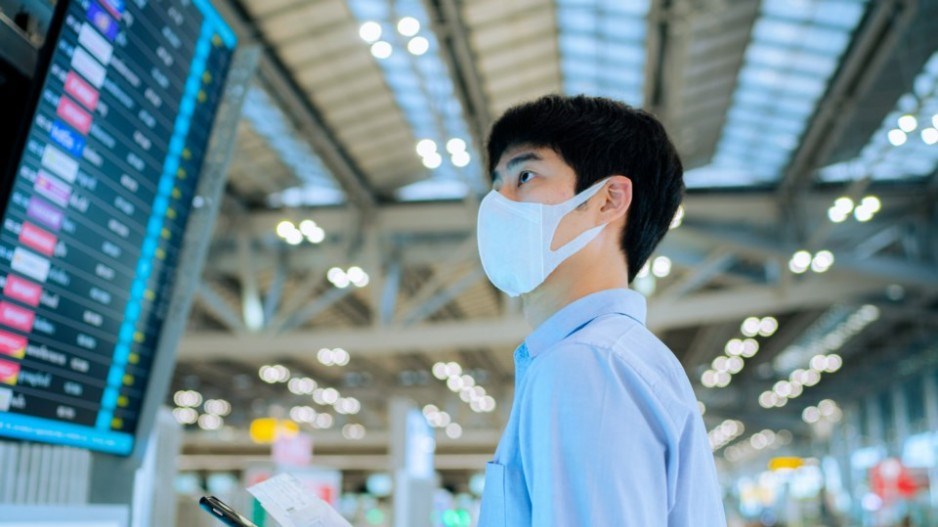The recent trend in the COVID-19 pandemic in B.C. has been a rise in new daily infections, and a decline in serious illness.
It takes a while for serious illnesses to develop, however, so the rise in new cases could foretell problems down the road.
There were 405 British Columbians diagnosed in the past day with COVID-19. That's the first time that number has been over 400 since November 25.
There are 276 COVID-19 patients in B.C. hospitals, which is the fewest since September 9. Of those 95 patients are in ICUs, which is the fewest since August 30.
Active cases rose by 51, compared with yesterday, to 3,071 – the highest number since November 22.
Of the 219,584 people known to have been infected with the disease since the first case was discovered in the province on January, 28, 2020, 214,047 people, or 97.5%, are considered recovered.
The B.C. government usually considers COVID-19 patients to have recovered if they have gone 10 days following first feeling symptoms, as they are therefore deemed to no longer be infectious. Some patients, however, continue to have health problems for months after their recoveries.
The 405 new cases detected in the past day includes:
• 110 in Fraser Health;
• 45 in Vancouver Coastal Health;
• 97in Interior Health;
• 57 in Northern Health; and
• 96 in Island Health.
The 3,071 active cases include:
• 990 in Fraser Health;
• 498 in Vancouver Coastal Health;
• 585 in Interior Health;
• 351 in Northern Health;
• 646 in Island Health; and
• one person who normally lives outside B.C.
Six more people have died from COVID-19 in the past day, raising the province's pandemic death toll to 2,351.
Unvaccinated people continue to be the ones most spreading the disease.
Between November 25 and December 1, people not fully vaccinated accounted for 58% of new cases, and between November 18 and December 1, those individuals accounted for 65.9% of hospitalizations.
This is despite the vast majority of British Columbians being fully vaccinated.
B.C. government data show that 4,240,459 residents have had at least one dose of vaccine, while 4,079,299, or 96.2% of those are fully vaccinated with two doses.
Children as young as five years old started to get vaccinated on Monday, and as a result there has been a jump in the number of new people getting their first doses of vaccine. There were 5,952 people who got their first dose of vaccine in B.C. in the past day, which is the highest number since October 6.
The government estimates that 85.1% of eligible British Columbians, older than five years, have had at least one vaccine shot, while 81.8% of that eligible group is considered fully vaccinated with two jabs.
The B.C. government last year estimated in that the province's total population is 5,147,712, so Glacier Media's calculation is that more than 82.3% of B.C.'s total population has had at least one dose of vaccine, and 79.2% of the province's total population has had two doses.
Booster shots in B.C. have started to be given to immunocompromised people, those older than 70 years who have gone six months after their second dose, as well as to those who received two AstraZeneca doses of vaccine, and have gone six months since their second dose. Others older than 18 years are expected to be allowed in stages to get booster doses in 2022.
So far, 469,176 people have received their booster dose, according to today's data. That is 16,583 more than yesterday.
Earlier today, Canada's National Advisory Committee on Immunization (NACI) expanded its recommended eligibility to encourage more COVID-19 vaccine booster shots because of reports that protection from the first two jabs wanes. This news comes as the Omicron variant rapidly spreads around the world.
Scientists do not know for sure the danger level for Omicron, which has more than 30 mutations from the original SARS-CoV-2 virus that causes COVID-19. For example, they remain unsure whether Omicron-induced illnesses will be more severe than those from previous COVID-19 strains, or whether the resulting disease will be better able to evade vaccine protection.
NACI now strongly recommends booster shots for people aged older than 50 years, and said adults older than 18 should also receive a booster dose.
There was one new outbreak at a health-care facility in the past day, at Ponderosa Lodge in Kamloops. The outbreak at Peace Villa in Fort St. John has been declared over. That leaves the province with five ongoing outbreaks in seniors' homes and hospitals. •




